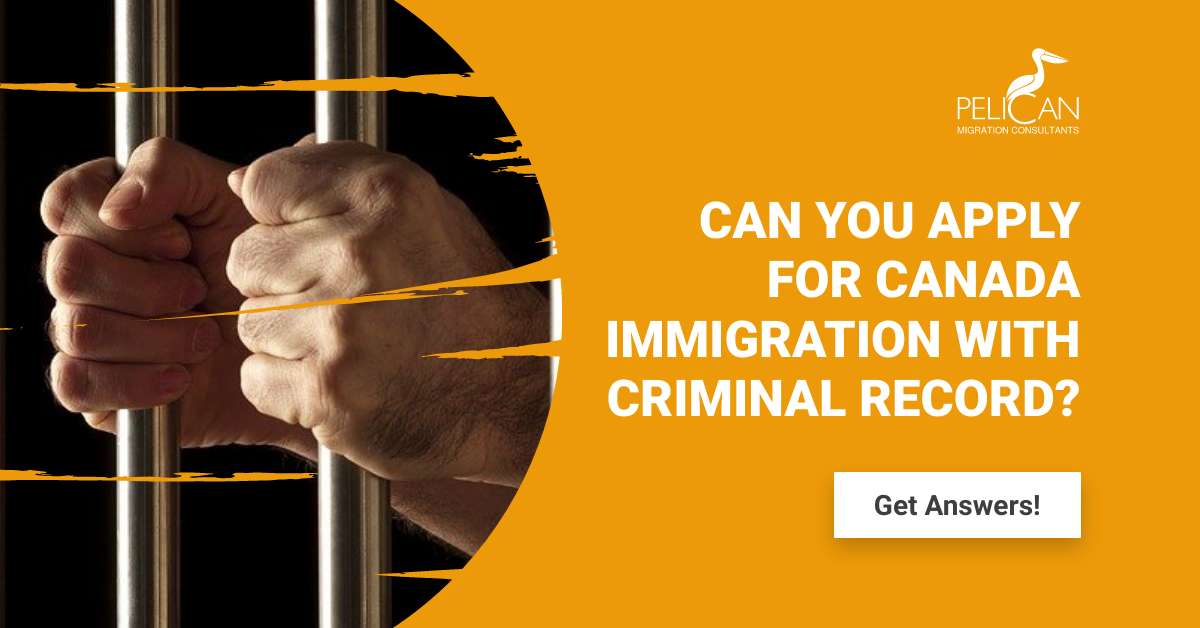
Canada, like all other countries, retains the right to refuse entry and residency to those who are deemed "criminally inadmissible." Under Canadian immigration rules, anyone convicted of a crime, no matter how minor, maybe criminally inadmissible. Even a hasty and careless decision to drive while inebriated can endanger your chances of getting into Canada. Continue reading to learn more about how criminal records can affect your PR Visa and what solutions are available.
What does “criminally inadmissible” mean?
It's important to remember that having a criminal record can prevent you from obtaining permanent residency. A criminal record can have a negative impact on your permanent residence and even inhibit you from wanting to stay in Canada. For the purposes of Canadian immigration, you may be considered "criminally inadmissible." When a person is denied entry to Canada due to criminality, this is known as criminal inadmissibility. You may be denied entry if you have committed a crime outside of Canada that is illegal in both the country where it occurred and in Canada. This includes convictions for minor to major offenses such as:
- Theft
- Manslaughter
- Dangerous driving
- Possession of or trafficking drugs or controlled substances
- Assault
- Driving while under the influence of drugs or alcohol
How can you still be considered eligible for Canada Immigration with a criminal record?
If you genuinely think you may be criminally inadmissible to Canada, there is a way of overcoming this obstacle. Depending on the nature of the crime, how long ago it occurred, and your subsequent behavior, you may still be permitted to enter Canada if you:
- If you Convince an immigration officer meeting the legal terms to be deemed rehabilitated
- If you have applied for rehabilitation and were approved
- If you were granted a record suspension
- If you have a temporary resident permit
If you Convince an immigration officer meeting the legal terms to be deemed rehabilitated:
In this frame of reference, rehabilitation means that, notwithstanding your previous record, you are unlikely to commit a punishable offense ever again and your entry into the country doesn't really pose a security risk. The type of offense you committed and the length of your rehabilitation determine your eligibility.
- If you meet the following criteria, you can do a self-assessment as well as apply for deemed rehabilitation somewhere at the Canadian port of entry:
- The nature and intent of your crime.
- There was a limit to how many crimes you could commit, so it couldn't be more than one.
- Justification for committing the crime, as well as why you are unlikely to do so again.
- In Canada, the crime you perpetrated is not considered a serious crime because it did not affect the use of a weapon, serious damage to property, or physical harm to anyone.
- Since committing the crime, you've acted in a certain way.
- Your thoughts on why you believe you have been rehabilitated
- Your current financial and personal situation.
Your self-assessment might well be rejected, and you'd be denied entry into Canada if you take this route.
- The second alternative is to fill out a rehabilitation request at a Canadian embassy, high commission, and perhaps even consulate in your region, submit the necessary documentation, as well as attend an interview to ascertain your eligibility for entrance as well as stay in Canada. Because this procedure can take up to six months, you should plan your immigration deadlines accordingly.
Applied for rehabilitation and were approved:
You must apply to the officials for individual rehabilitation if you have committed a crime that carries a sentence of ten years or over, or if you want to gain entry in Canada within five years of completing your sentence. You cannot request deemed rehabilitation just at the port of entry. You must apply for this including your visit, study, as well as work permit approval process, and you will only be allowed to enter Canada if your request is granted. Only convictions that occurred outside of Canada are eligible for criminal rehabilitation.
When a person is considering applying for Criminal Rehabilitation, the translation of their criminal background into the Canadian equivalent is critical.
This process necessitates a thorough examination of Canada's Criminal Code in light of the rules of the nation where the person was convicted. The Canadian government charges fees for CR processing. The sum of this charge varies depending on whether the criminal record is for non-serious or serious offenses. For non-serious criminal activity, the fee is $200 CAD, and then for serious criminality, the fee is $1,000 CAD. If you were found guilty of an offense in Canada, you may be required to seek a pardon from the Parole Board of Canada, depending on the situation.
You Were granted a record suspension:
The Parole Board of Canada's record suspension, formerly known as a pardon, results in the total abolition of your criminal disqualification. If you committed a crime outside of Canada, you must apply for a pardon or a record suspension with the competent authorities as well as check whether the pardon will be recognized in Canada. Acquiring a record suspension can help you avoid having a non-conviction record affect your immigration status. A "non-conviction record" is a list of criminal charges that have been dismissed, discharged, or withdrawn. A non-conviction record can influence your immigration application even if you have been never charged. As a result, even if you have a non-conviction record, you must apply for a record suspension.
You Have a temporary resident permit:
When you are not able to qualify for rehabilitation but have compelling reasons to remain in Canada, as well as your need, outweigh the risks to Canadian society, the immigration officer will issue you this permit. A TRP, on the other hand, must be renewed every year, whereas successful rehabilitation permanently settles the issue of criminal inadmissibility for future visits to Canada.
Temporary Resident Permit VS Criminal Rehabilitation
Permission for criminal entry can be obtained through a Canadian Temporary Resident Permit, or TRP, which is the quickest way to gain admission but expires after a certain period of time, or through a procedure known as Criminal Rehabilitation, which takes much longer but is permanent. A Canada TRP allows a foreign citizen with a criminal history to enter Canada for a brief amount of time. It can be approved for a single entry or multiple entries over a three-year period. The Canada Criminal Rehabilitation program allows people with criminal records to clear their records and remove their inadmissibility for good, but this is only available to people who have served their full sentence (all fines paid, probation completed, etc.) more than five years ago. If you haven't served your full sentence in more than five years, a Temporary Resident Permit may be the only option for entering Canada with a criminal record.
Criminal inadmissibility is a serious matter, particularly for those seeking to immigrate to Canada. It has the potential to keep you from achieving your Canadian dream. There is, however, a route to become admissible. Your eligibility and terms will be determined by a number of factors. Thus, applying for a Canadian PR Visa is not easy, and that too with a criminal record. You need someone who is professional and has valuable experiential insights about the process - a licensed consultant - RCIC (Regulated Canadian Immigration Consultants); who are legally authorized by the Canadian Government to represent immigrants in their application process.
Would You Like to Migrate to Canada with a Criminal record?
At Pelican Migration Consultants, our primary goal is to offer you all the necessary information you require to make the right decisions. We help you plan and manage your immigration to Canada and eventually lead a successful life in the country of your dreams. What’s more, we don’t make you spend a penny more or wait a day longer until and unless it is out of our control.
Because of the continuously changing immigration standards and regulations, which are hard to interpret and pursue, it is best to contact Canada Immigration Consultants who can assist and guide you throughout the process. We provide professional one-to-one assistance ensuring you give your best in front of the Canadian Immigration Department. We help the clients in analyzing the clients' chances of being granted a visa, then preparing clients and giving feedback for VISA interviews, developing a customized immigration strategic plan for each client separately. Best Wishes!


